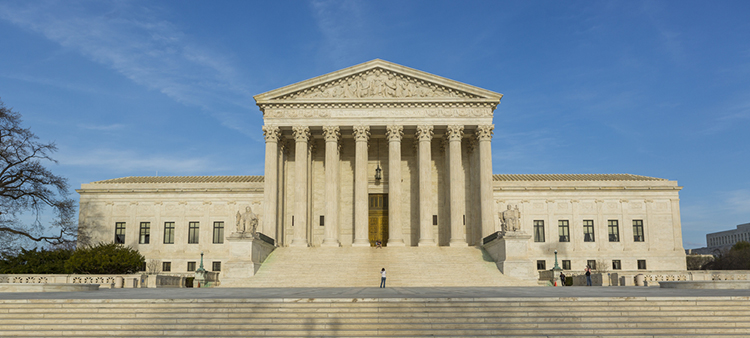Supreme Court upholds Trump's travel ban, cites national security justification

Shutterstock
The U.S. Supreme Court on Monday upheld President Donald Trump's third travel ban in a 5-4 decision.
The court said the travel ban was “squarely within the scope of presidential authority” under the Immigration and Nationality Act, and the plaintiffs’ First Amendment claim was unlikely to succeed.
Chief Justice John G. Roberts Jr. wrote the majority opinion. Roberts said the government had advanced a sufficient national security justification, though “we express no view on the soundness of the policy.” The court reversed a preliminary injunction banning the policy from taking effect and remanded the case for further proceedings.
The court did not decide whether a nationwide injunction was permissible.
The travel ban restricts travel to the United States from seven countries, including five predominantly Muslim nations—Iran, Libya, Somalia, Syria and Yemen. The other two countries are North Korea and Venezuela. An eighth country, Chad, was removed from the list in April.
The travel ban before the court represented Trump’s third attempt to restrict travel from certain nations.
Trump dropped the first travel ban after several courts ruled it could not be applied to people who had the right to be in the United States because they had green cards and valid visas. One federal appeals court went further and said the travel ban was impermissible discrimination based on religion. The second version of the travel ban applied for a limited period. Before it lapsed, several courts had also found it was likely unconstitutional or it violated the federal law that bars visa discrimination.
The plaintiffs challenging the latest travel ban had pointed to anti-Muslim statements by Trump. They contended those statements showed the travel ban was a pretext for discrimination that violated the establishment clause of the First Amendment. Roberts said the significance of those statements should be considered along with the president’s authority.
The INA grants the president broad authority to suspend the entry of aliens into the United States. “By its terms,” Roberts said, the law “exudes deference to the president in every clause.” And the president lawfully exercised that discretion based on findings that followed a worldwide, multiagency review of countries’ compliance with information sharing and risk assessment, Roberts said.
The president’s statements may be considered, Roberts said, but the travel ban should be upheld if it is reasonably understood to stem from a constitutional justification. The national security justification was sufficient, Robert said. His opinion was joined by Justices Anthony M. Kennedy, Samuel A. Alito Jr., Clarence Thomas and Neil Gorsuch.
“The proclamation is expressly premised on legitimate purposes: preventing entry of nationals who cannot be adequately vetted and inducing other nations to improve their practices,” Roberts said. “The text says nothing about religion.”
Roberts said a dissent invokes Korematsu v. United States, the often-criticized decision that upheld the internment of Japanese-Americans during World War II. The dissent—written by Justice Sonia Sotomayor and joined by Justice Ruth Bader Ginsburg—saw parallels between the reasoning of the travel ban majority and the Korematsu court.
But Roberts said Korematsu “has nothing to do with this case. The forcible relocation of U.S. citizens to concentration camps, solely and explicitly on the basis of race, is objectively unlawful and outside the scope of presidential authority. But it is wholly inapt to liken that morally repugnant order to a facially neutral policy denying certain foreign nationals the privilege of admission.”
SCOTUSblog notes a concurrence by Kennedy and says its “subtext is pretty close to the surface” in that it seems designed to chastise the president.
Kennedy said it is “an urgent necessity that officials adhere” to constitutional guarantees of the First Amendment. “An anxious world must know that our government remains committed always to the liberties the Constitution seeks to preserve and protect, so that freedom extends outward, and lasts,” he wrote.
In a separate concurrence, Thomas said he was skeptical that district courts have the authority to enter universal inunctions that ban the government from applying a law or policy to anyone, not just the plaintiffs.
Justice Stephen G. Breyer wrote a separate dissent in an opinion joined by Justice Elena Kagan.
Breyer said he would remand the case for further proceedings to determine whether exemptions in the travel ban are being implemented in a way that shows no bias based on religion. If the question has to be decided without further litigation, evidence of anti-religious bias is sufficient to overturn the travel ban, Breyer said.
Sotomayor said in her dissent that any reasonable observer would conclude that the travel ban was motivated by anti-Muslim bias that violates the establishment clause. The majority decision “leaves undisturbed a policy first advertised openly and unequivocally as a ‘total and complete shutdown of Muslims entering the United States’ because the policy now masquerades behind a façade of national-security concerns,” Sotomayor wrote. “But this repackaging does little to cleanse Presidential Proclamation No. 9645 of the appearance of discrimination that the president’s words have created.”
The case is Trump v. Hawaii.
Hat tip to SCOTUSblog, which quickly summarized the opinion.
Related articles:
ABAJournal.com: “Courts have power to review travel ban, enforce limits on executive power, ABA says in SCOTUS brief”
ABAJournal.com: “Will swing voter Kennedy uphold Trump’s travel ban? Oral arguments show support for US position”
ABAJournal.com: “Chemerinsky: The travel ban and the Supreme Court”
ABAJournal.com: “SCOTUS agrees to hear case on Trump’s latest travel ban”



